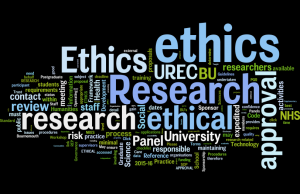 This morning we meet members from the Social Sciences & Humanities Research Ethics Panel (SSH REP).
This morning we meet members from the Social Sciences & Humanities Research Ethics Panel (SSH REP).
I joined the Panel at an interesting time – with the Pandemic hitting just a few short months after joining. I only had the pleasure of meeting my fellow Panel members in person once before we switched to virtual working. The current situation has also challenged our way of thinking about research in the current context. A lot of our recent discussions have focussed on researcher and participant safety and formulating suitable ethical protocols for online forms of data collection – particularly the use of Zoom and Microsoft Teams.
One of the things I have most enjoyed about being an SSH REP member is having the opportunity to learn about the exciting, innovative and important research that goes on across BU – outside of my own discipline. Every month I’m blown away by the innovative research projects that I have the pleasure of reading about. Many of these address current challenges such as the Covid Pandemic, well-being and links to the UN Sustainability goals.
Over the last few months we have changed the way we review Ethics documents that come to the Panel. Each research project is now assigned a lead reviewer and a secondary reviewer, which allows us the space and capacity to really delve into each project we are assigned to in-depth.
Working with fellow Panel members has also enhanced the quality of the Ethics documents I produce and enabled me to further support my own students as they embark on the Ethics process. Sometimes Ethics is seen as a tick box exercise, but if anything being a part of this Panel over the last year has reinforced to me the important role that Ethics plays in ensuring our physical and psychological safety, that of our participants and in strengthening the quality of research.
Finally, there is sometimes apprehension experienced over being asked to present research at Ethics Panels, however I can safely say that we are all a very supportive group of people, who strive to provide proportionate, consistent and high quality of research across the University. I have personally thoroughly enjoyed being part of the Panel. So if you are submitting your Ethics documentation – good luck and we hope to see you at a Panel soon!
Dr Osi Okwilagwe, Lecturer in Strategy, BUBS
A few years ago, whilst fresh out of my PhD journey and as a new member of staff, I joined the SSH REP. As an Early Career Researcher, I was indeed new to the world of research ethics and was especially pleased to be offered a place by Dr Sean Beer who was Panel chair at the time. In my four years on the role and currently working with a new Panel chaired by Prof Jonathan Parker, I have come to appreciate how large the industry of research is and how important it is for the members of the SSH REP to have a real interest in supporting Social Sciences & Humanities research at BU and in protecting potential participants’ interests – to give their opinion on whether the research methodology is ethical and fair. For me it has been an eye opener working with senior and more experienced colleagues reviewing each month an array of ethics checklists submitted by staff and postgraduate research students, all who conduct very interesting research.
I suppose when people think about ethical research, they think of rules for distinguishing between what is considered acceptable and unacceptable behaviour – right from wrong! Submitting ethics checklists for an ethics review or attending an interview with the Panel for a submission assessed as above minimal risk is really not daunting contrary to popular opinion. The SSH REP understands the sometimes complex issues involved in reaching ethical decisions; bear in mind that the Panel’s aim is to promote and facilitate research at BU. Staff and postgraduate research students who submit their ethics checklist should also not despair if the feedback from the Panel entails a long list of suggestions or amendments, as the role of the SSH REP is to ensure that all research carried out, is conducted to the highest possible ethical standards for research and to provides support to staff and students planning research projects. The mixed experiences and backgrounds of members that make up the Panel allow for wide perspectives as possible. Panel members take a robust approach to the consideration of risk and benefits of a research project. Each member brings their own valuable perspective, knowledge, and experience, as well as concern of the ethics checklist submitted for a particular research project to the Panel’s deliberations. Hence, the feedback given are usually suggestions for researchers to take on board to amend the ethics checklist or to improve the participant’s information sheet; invariably helping towards increasing the likelihood of participant recruitment and of generating quality and publishable research results.
The invaluable experience I have gained from reviewing submissions and working with the SSH REP, has allowed me to appreciate the diverse nature of research carried out by our colleagues at BU and has also ingrained in me that as researchers, a key duty is to promote ethical research.
Here are 3 top tips I like to share when considering making an ethics checklist submission:
1. If researchers are new to research, do ask for help, perhaps from a more experienced colleague/supervisor or send an email to the Research ethics team with any questions.
2. Complete the ethics checklist carefully and read the guidance on the documents to be submitted along with the checklist.
3. Spend a considerable amount of time on the Participant Information Sheet; the adequacy of consent is important. So do identify any contentious issues there may be in conducting the research.
 Meet members of the Research Ethics Panels
Meet members of the Research Ethics Panels Research Ethics – Central Research Ethics Panels
Research Ethics – Central Research Ethics Panels










 Dr. Ashraf cited on ‘Modest Fashion’ in The Guardian
Dr. Ashraf cited on ‘Modest Fashion’ in The Guardian NIHR-funded research launches website
NIHR-funded research launches website Academics write for newspaper in Nepal
Academics write for newspaper in Nepal New paper published on disability in women & girls
New paper published on disability in women & girls MSCA Postdoctoral Fellowships 2025 Call
MSCA Postdoctoral Fellowships 2025 Call ERC Advanced Grant 2025 Webinar
ERC Advanced Grant 2025 Webinar Horizon Europe Work Programme 2025 Published
Horizon Europe Work Programme 2025 Published Horizon Europe 2025 Work Programme pre-Published
Horizon Europe 2025 Work Programme pre-Published Update on UKRO services
Update on UKRO services European research project exploring use of ‘virtual twins’ to better manage metabolic associated fatty liver disease
European research project exploring use of ‘virtual twins’ to better manage metabolic associated fatty liver disease